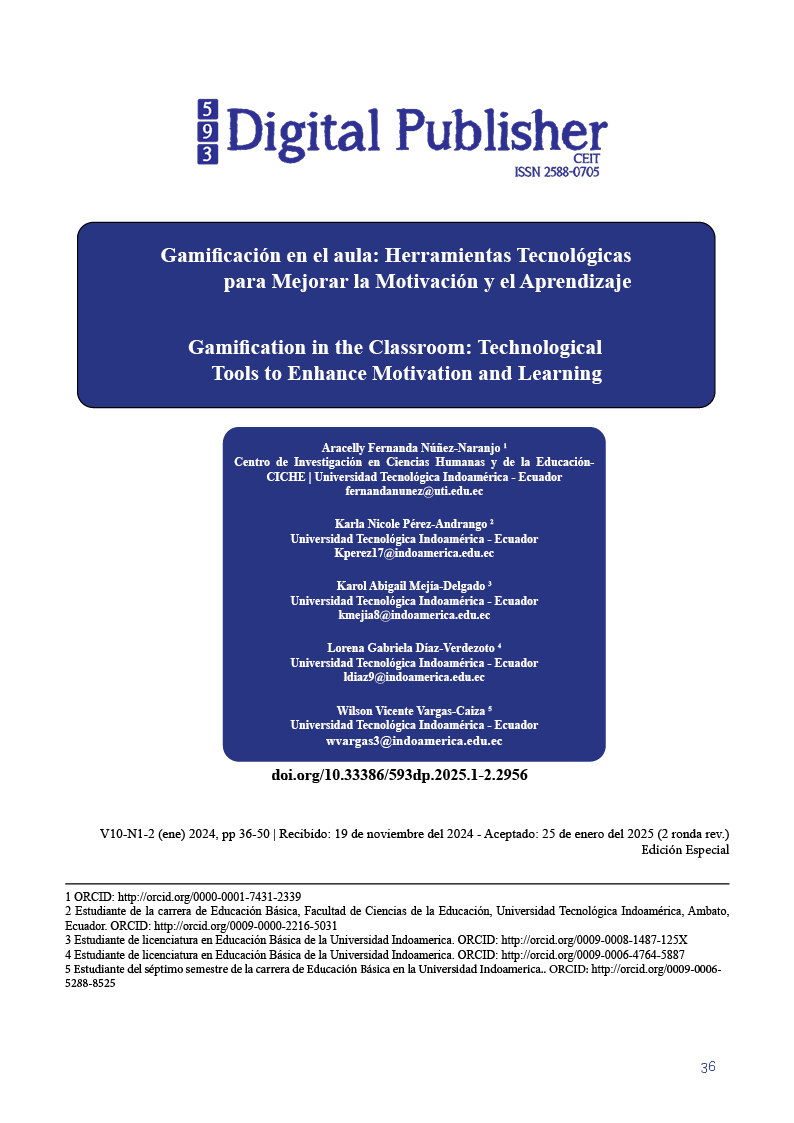Gamification in the Classroom: Technological Tools to Enhance Motivation and Learning
Main Article Content
Abstract
Introduction: Gamification is conceived as an innovative strategy that transforms the educational process by integrating game dynamics into non-play contexts. This approach addresses the demands of an ever-changing society, ensures inclusive and equitable education, and enriches learning experiences by promoting active participation. Elements such as rewards, levels, and leaderboards are employed to capture students' attention and keep them focused. Objective: The goal is to analyze the impact of gamification in the classroom through the use of technological resources, identifying how these strategies can enhance students' motivation and learning. Methodology: The methodology employed adopts a qualitative approach with a descriptive and analytical design. A systematic review of academic literature on the implementation of gamification in education was conducted. Results: The findings of this research not only contribute to existing literature but also significantly improve student motivation and participation, fostering inclusion and educational equity in digital and diverse contexts. Conclusion: In conclusion, gamification enhances learning by transforming monotonous tasks into dynamic experiences. Its implementation requires creativity and careful planning to ensure effectiveness and prevent disengagement.
Downloads
Article Details

This work is licensed under a Creative Commons Attribution-NonCommercial-ShareAlike 4.0 International License.
1. Derechos de autor
Las obras que se publican en 593 Digital Publisher CEIT están sujetas a los siguientes términos:
1.1. 593 Digital Publisher CEIT, conserva los derechos patrimoniales (copyright) de las obras publicadas, favorece y permite la reutilización de las mismas bajo la licencia Licencia Creative Commons 4.0 de Reconocimiento-NoComercial-CompartirIgual 4.0, por lo cual se pueden copiar, usar, difundir, transmitir y exponer públicamente, siempre que:
1.1.a. Se cite la autoría y fuente original de su publicación (revista, editorial, URL).
1.1.b. No se usen para fines comerciales u onerosos.
1.1.c. Se mencione la existencia y especificaciones de esta licencia de uso.
References
Acurio Ponce, B., & Nuñez Naranjo, A. (2019). Creo, juego y aprendo con estrategias y recursos para mejorar la comprensión lectora. 593 Digital Publisher CEIT, ISSN-e 2588-0705, Vol. 4, No. 2, 2019 (Ejemplar Dedicado a: Education), Págs. 44-59, 4(2), 44–59. https://dialnet.unirioja.es/servlet/articulo?codigo=7144029&info=resumen&idioma=SPA
Adell, F. L., Castillo, I., Álvarez, O., & Tomás, I. (2019). Valores personales en el baloncesto de formación y su relación con el bienestar y la intención futura de práctica a través de la motivación. Cuadernos de Psicología Del Deporte, 19(2), 227–242. https://doi.org/10.6018/cpd.363331
Agbenorxevi, C. D., Hevi, S. S., Malcalm, E., Akude, J., & Coleman, R. K. N. (2023). Gamified Problem Gambling and Psychological Distress: The Mediated-Moderated Roles of Cognitive and Economic Motives. Journal of Gambling Studies, 39(3), 1355–1370. https://doi.org/10.1007/s10899-023-10219-w
Alamri, I. K. A. (2025). Gameful learning investigating the impact of game elements, interactivity, and learning style on student success. Multidisciplinary Science Journal, 7(3). https://doi.org/10.31893/MULTISCIENCE.2025108
Aldalur, I. (2024). Gamifying software engineering subject to enhance the quality of knowledge. Software: Practice and Experience, 54(12), 2299–2315. https://doi.org/10.1002/SPE.3339
Baah, C., Govender, I., & Subramaniam, P. R. (2024). Enhancing Learning Engagement: A Study on Gamification’s Influence on Motivation and Cognitive Load. Education Sciences 2024, Vol. 14, Page 1115, 14(10), 1115. https://doi.org/10.3390/EDUCSCI14101115
Barata, G., Gama, S., Fonseca, M. J., & Gonçalves, D. (2013). Improving student creativity with gamification and virtual worlds. ACM International Conference Proceeding Series, 95–98. https://doi.org/10.1145/2583008.2583023
Berrones Yaulema, L. P., Espinoza Tinoco, L. M., Congacha Ausha, A. E., & Moyano Guamán, M. A. (2023). La gamificación en el aprendizaje significativo de las asignaturas de educación básica. Polo Del Conocimiento: Revista Científico - Profesional, ISSN-e 2550-682X, Vol. 8, No. 7 (JULIO 2023), 2023, Págs. 240-262, 8(7), 240–262. https://dialnet.unirioja.es/servlet/articulo?codigo=9234519&info=resumen&idioma=ENG
Boccoli, G., Tims, M., Gastaldi, L., & Corso, M. (2024). The psychological experience of flexibility in the workplace: How psychological job control and boundary control profiles relate to the wellbeing of flexible workers. Journal of Vocational Behavior, 155. https://doi.org/10.1016/j.jvb.2024.104059
Capatina, A., Juarez-Varon, D., Micu, A., & Micu, A. E. (2024). Leveling up in corporate training: Unveiling the power of gamification to enhance knowledge retention, knowledge sharing, and job performance. Journal of Innovation and Knowledge, 9(3). https://doi.org/10.1016/j.jik.2024.100530
Carrión, J. P. R., Fernández, J. R. D., Ureña, C. I. V., Angamarca, L. A. M., & Aguilar, A. O. T. (2023). Gamificación como estrategia didáctica en el rendimiento académico de ecuaciones de primer grado con una incógnita. Ciencia Latina Revista Científica Multidisciplinar, 7(1), 9497–9515. https://doi.org/10.37811/CL_RCM.V7I1.5074
Chaiyarat, K. (2024). Enhancing creative problem solving and learning motivation in social studies classrooms with gamified cooperative learning. Thinking Skills and Creativity, 54, 101616. https://doi.org/10.1016/J.TSC.2024.101616
Chaiyo, Y., & Nokham, R. (2017). The effect of Kahoot, Quizizz and Google Forms on the student’s perception in the classrooms response system. 2nd Joint International Conference on Digital Arts, Media and Technology 2017: Digital Economy for Sustainable Growth, ICDAMT 2017, 178–182. https://doi.org/10.1109/ICDAMT.2017.7904957
Clausen, H. (1976). Om påvirkning af den kognitive udvikling—i relation til Piagets teori. Nordisk Psykologi, 28(1), 34–47. https://doi.org/10.1080/00291463.1976.10637111
Da Rocha Seixas, L., Gomes, A. S., & De Melo Filho, I. J. (2016). Effectiveness of gamification in the engagement of students. Computers in Human Behavior, 58, 48–63. https://doi.org/10.1016/J.CHB.2015.11.021
Das, S., Vaishnavi Nakshatram, S., Söbke, H., Baalsrud Hauge, J., & Springer, C. (2025). Towards gamification for spatial digital learning environments. Entertainment Computing, 52. https://doi.org/10.1016/j.entcom.2024.100893
Domínguez, A., Saenz-De-Navarrete, J., De-Marcos, L., Fernández-Sanz, L., Pagés, C., & Martínez-Herráiz, J. J. (2013). Gamifying learning experiences: Practical implications and outcomes. Computers and Education, 63, 380–392. https://doi.org/10.1016/J.COMPEDU.2012.12.020
Do, N., Jin, T., Priest, R., Meredith, L. N., & Landers, R. N. (2024). A longitudinal quasi-experiment of leaderboard effectiveness on learner behaviors and course performance. Learning and Individual Differences, 116. https://doi.org/10.1016/j.lindif.2024.102572
El-Sayed, M. M., Taha, S. M., AbdElhay, E. S., & Hawash, M. M. (2024). Understanding the relationship of academic motivation and social support in graduate nursing education in Egypt. BMC Nursing, 23(1). https://doi.org/10.1186/s12912-023-01671-5
Fernández-Vázquez, D., Navarro-López, V., Cano-de-la-Cuerda, R., Palacios-Ceña, D., Espada, M., Bores-García, D., Delfa-de-la-Morena, J. M., & Romero-Parra, N. (2024). Influence of Virtual Reality and Gamification Combined with Practice Teaching Style in Physical Education on Motor Skills and Students’ Perceived Effort: A Mixed-Method Intervention Study. Sustainability (Switzerland), 16(4), 1584. https://doi.org/10.3390/SU16041584/S1
Gallardo-Montes, C. del P., Caurcel Cara, M. J., & Rodríguez Fuentes, A. (2022). Technologies in the education of children and teenagers with autism: evaluation and classification of apps by work areas. Education and Information Technologies, 27(3), 4087–4115. https://doi.org/10.1007/S10639-021-10773-Z/FIGURES/2
Gallego-Durán, F. J., Villagrá-Arnedo, C. J., Satorre-Cuerda, R., Compañ-Rosique, P., Molina-Carmona, R., & Llorens-Largo, F. (2019). A guide for game-design-based gamification. Informatics, 6(4). https://doi.org/10.3390/informatics6040049
García-Mendoza, D., & Corral-Joza, K. (2021). El microaprendizaje y su aporte en la habilidad de concentración en estudiantes de bachillerato. Revista Innova Educación, 3(4), 28–39. https://doi.org/10.35622/J.RIE.2021.04.002
Habachi, S., Matute, J., & Palau-Saumell, R. (2024). Gamify, engage, build loyalty: exploring the benefits of gameful experience for branded sports apps. Journal of Product and Brand Management, 33(1), 57–75. https://doi.org/10.1108/JPBM-07-2022-4070/FULL/PDF
Habe, K., & Biasutti, M. (2023). Flow in Music Performance: From Theory to Educational Applications. Psihologijske Teme, 32(1), 179–195. https://doi.org/10.31820/PT.32.1.10
Hjellvik, S., & Mallam, S. (2024). Training transfer validity of virtual reality simulator assessment. Virtual Reality, 28(4), 1–17. https://doi.org/10.1007/S10055-024-01058-0/TABLES/5
Homont, L. P. P., & Alcoceba Hernando, J. A. (2025). Motivation of university students: between amotivation and intrinsic motivation. European Public and Social Innovation Review, 10. https://doi.org/10.31637/epsir-2025-306
Imbaquingo Guerrero, J. A., Luzuriaga Ruiz, T. L., & Ramírez Collaguazo, P. E. (2023). Gamificación y educación una mirada a los procesos de enseñanza aprendizaje. LATAM Revista Latinoamericana de Ciencias Sociales y Humanidades, 4(2). https://doi.org/10.56712/latam.v4i2.891
Jaramillo-Mediavilla, L., Basantes-Andrade, A., Cabezas-González, M., & Casillas-Martín, S. (2024). Impact of Gamification on Motivation and Academic Performance: A Systematic Review. Education Sciences 2024, Vol. 14, Page 639, 14(6), 639. https://doi.org/10.3390/EDUCSCI14060639
Kisamore, A. N., Carr, J. E., & LeBlanc, L. A. (2011). TRAINING PRESCHOOL CHILDREN TO USE VISUAL IMAGINING AS A PROBLEM-SOLVING STRATEGY FOR COMPLEX CATEGORIZATION TASKS. Journal of Applied Behavior Analysis, 44(2), 255–278. https://doi.org/10.1901/JABA.2011.44-255
López-Marí, M., San Martín-Alonso, Á., & Peirats-Chacón, J. (2022). De los videojuegos a la gamificación como estrategia metodológica inclusiva. Revista Colombiana de Educación, 84. https://doi.org/10.17227/rce.num84-12518
Martin, M. M., González, A. H., Barletta, C. M., & Sadaba, A. I. (2012). Aulas virtuales, convergencia tecnológica y formación de profesores. http://sedici.unlp.edu.ar/handle/10915/18316
Mekler, E. D., Brühlmann, F., Tuch, A. N., & Opwis, K. (2017). Towards understanding the effects of individual gamification elements on intrinsic motivation and performance. Computers in Human Behavior, 71, 525–534. https://doi.org/10.1016/J.CHB.2015.08.048
Mellado, R., Cubillos, C., Vicari, R. M., & Gasca-Hurtado, G. (2024). Leveraging Gamification in ICT Education: Examining Gender Differences and Learning Outcomes in Programming Courses. Applied Sciences 2024, Vol. 14, Page 7933, 14(17), 7933. https://doi.org/10.3390/APP14177933
Mendieta Parra, D. I., Balarezo Lata, E. D., Pérez Sienes, J. M., & Hurtado Crespo, G. P. (2023). Desarrollo de una aplicación móvil aplicando la gamificación como apoyo a la estimulación cognitiva de niños con Síndrome de Down. LATAM Revista Latinoamericana de Ciencias Sociales y Humanidades, 4(1). https://doi.org/10.56712/latam.v4i1.403
Meng, C., Zhao, M., Pan, Z., Pan, Q., & Bonk, C. J. (2024a). Investigating the impact of gamification components on online learners’ engagement. Smart Learning Environments, 11(1). https://doi.org/10.1186/s40561-024-00336-3
Meng, C., Zhao, M., Pan, Z., Pan, Q., & Bonk, C. J. (2024b). Investigating the impact of gamification components on online learners’ engagement. Smart Learning Environments, 11(1). https://doi.org/10.1186/s40561-024-00336-3
Mero Mendoza, G. M., & Castro Bermúdez, I. E. (2021a). La gamificación educativa y sus desafíos actuales desde la perspectiva pedagógica. Revista Cognosis. ISSN 2588-0578, 6(2), 111. https://doi.org/10.33936/COGNOSIS.V6I2.2902
Mero Mendoza, G. M., & Castro Bermúdez, I. E. (2021b). La gamificación educativa y sus desafíos actuales desde la perspectiva pedagógica. Revista Cognosis. ISSN 2588-0578, 6(2), 111. https://doi.org/10.33936/cognosis.v6i2.2902
Miranda-Núñez, Y. R. (2022). Aprendizaje significativo desde la praxis educativa constructivista. Revista Arbitrada Interdisciplinaria Koinonía, 7(13), 79–91. https://doi.org/10.35381/r.k.v7i13.1643
Mohammed, M., Fatemah, A., & Hassan, L. (2024). Effects of Gamification on Motivations of Elementary School Students: An Action Research Field Experiment. Simulation and Gaming, 55(4), 600–636. https://doi.org/10.1177/10468781241237389
Montero-Izquierdo, A. I., Jeong, J. S., & González-Gómez, D. (2024). A future classroom lab with active and gamified STEAM proposal for mathematics and science disciplines: Analyzing the effects on pre-service teacher’s affective domain. Heliyon, 10(16). https://doi.org/10.1016/J.HELIYON.2024.E35911/ATTACHMENT/4D437AF7-BD1A-45E5-AB42-A39C83C00EB6/MMC1.PDF
Moon, J., McNeill, L., Edmonds, C. T., Banihashem, S. K., & Noroozi, O. (2024a). Using learning analytics to explore peer learning patterns in asynchronous gamified environments. International Journal of Educational Technology in Higher Education, 21(1), 1–36. https://doi.org/10.1186/S41239-024-00476-Z/FIGURES/4
Morales, E., Ocaña, J., Yánez, H., & Nuñez, A. (2021). Innovación metodológica para la enseñanza de TIC en educación superior. Revista Ibérica de Sistemas ETecnologias de Informação, 1(46), 507–517.
Núñez-Naranjo, A., Sinailin-Peralta, J., & Morales-Urrutia, E. (2024a). Gamification: From Motivation and Challenges to Improving Academic Performance in Learning Mathematics. Lecture Notes in Networks and Systems, 773, 106–113. https://doi.org/10.1007/978-3-031-44131-8_11
Núñez-Naranjo, A., Sinailin-Peralta, J., & Morales-Urrutia, E. (2024b). Gamification: From Motivation and Challenges to Improving Academic Performance in Learning Mathematics. In Lecture Notes in Networks and Systems (Vol. 773). https://doi.org/10.1007/978-3-031-44131-8_11
Núñez-Naranjo, A., Sinailin-Peralta, J., & Morales-Urrutia, E. (2024c). Gamification: From Motivation and Challenges to Improving Academic Performance in Learning Mathematics. Lecture Notes in Networks and Systems, 773, 106–113. https://doi.org/10.1007/978-3-031-44131-8_11
Ojeda, J., Macancela, P., Hurtado, G., & Peréz, J. (2023). Desarrollo de entornos virtuales de enseñanza aprendizaje con herramientas web 3.0 y 4.0 para la asignatura de inglés. Ciencia Latina Revista Científica Multidisciplinar, 7(1). https://doi.org/10.37811/cl_rcm.v7i1.4894
Ortiz-Colón, A.-M., Jordán, J., & AgredaI, M. (1737). Gamificación en educación: una panorámica sobre el estado de la cuestión SECCIÓN: ARTÍCULOS This content is licensed under a Creative Commons attribution-type BY-NC. 44. https://doi.org/10.1590/S1678-4634201844173773
Ortiz-Colón, A. M., Jordán, J., & Agredai, M. (2018). Gamification in education: An overview on the state of the art. Educacao e Pesquisa, 44. https://doi.org/10.1590/S1678-4634201844173773
Párraga, A. P. B., Cedeño, E. L. H., Amores, C. G. R., Molina, A. D. A., Batioja, I. J. Z., Lloacana, M. Y. S., & Duran, V. D. R. C. (2024). La Gamificación como Estrategia Pedagógica en la Educación Matemática. Ciencia Latina Revista Científica Multidisciplinar, 8(3), 6435–6465. https://doi.org/10.37811/CL_RCM.V8I3.11834
Pavlenko, T., Argyropoulos, D., Arnoult, M., Engel, T., Gadanakis, Y., Griepentrog, H. W., Kambuta, J., Latherow, T., Murdoch, A. J., Tranter, R., & Paraforos, D. S. (2024). Stimulating awareness of Precision Farming through gamification: The Farming Simulator case. Smart Agricultural Technology, 9. https://doi.org/10.1016/j.atech.2024.100529
Pu Song, Guanggui Qi, Lidan Zhang, Peiti Li, & Zhengli Chen. (2024). Gamification in Mobile Applications: The Regulation of Children’s Course Games by Commensurability Education System. International Journal of Interactive Mobile Technologies (IJIM), 18(17), 4–16. https://doi.org/10.3991/ijim.v18i17.50789
Rodríguez Jiménez, C., Ramos Navas-Parejo, M., Santos Villalba, M. J., & Fernández Campoy, J. M. (2019). El uso de la gamificación para el fomento de la educación inclusiva. International Journal of New Education, 2(1). https://doi.org/10.24310/ijne2.1.2019.6557
Song, T., Zhang, C., & Wang, W. (2025). Research on the design of gamified classroom teaching mode based on fuzzy conjoint analysis method. Entertainment Computing, 52, 100901. https://doi.org/10.1016/J.ENTCOM.2024.100901
Tokarieva, A. V., & Сhyzhykova, I. V. (2022). UNDERSTANDING EDUCATORS’ EXPERIENCE AND ATTITUDE TO GAMIFIED LEARNING APPLICATIONS. Bulletin of Alfred Nobel University Series "Pedagogy and Psychology», 1(23), 211–222. https://doi.org/10.32342/2522-4115-2022-1-23-25
Trejo González, H. (2019). Estudios de investigación Recursos tecnológicos para la integración de la gamificación en el aula (Vol. 13).
View of Gamificación: Estrategia para optimizar el proceso de aprendizaje y la adquisición de competencias en contextos universitarios. (n.d.-b). Retrieved November 23, 2024, from https://revistes.ub.edu/index.php/der/article/view/11591/pdf
Villalustre-Martínez, L. (2024). Narraciones gamificadas y evaluación de competencias en la formación inicial del profesorado. Ocnos, 23(2). https://doi.org/10.18239/OCNOS_2024.23.2.431
Wang, J., Gong, S., Cao, Y., Guo, X., & Peng, P. (2025). Personalization in educational gamification: Learners with different trait competitiveness benefit differently from rankings on leaderboards. Computers & Education, 225, 105196. https://doi.org/10.1016/J.COMPEDU.2024.105196
Wang, Y., Guo, S., Ling, L., & Tan, C. W. (2024). Nemobot: Crafting Strategic Gaming LLM Agents for K-12 AI Education. L@S 2024 - Proceedings of the 11th ACM Conference on Learning @ Scale, 393–397. https://doi.org/10.1145/3657604.3664671
Zainuddin, Z. (2023a). Integrating ease of use and affordable gamification-based instruction into a remote learning environment. Asia Pacific Education Review. https://doi.org/10.1007/s12564-023-09832-6
Zainuddin, Z. (2023b). Integrating ease of use and affordable gamification-based instruction into a remote learning environment. Asia Pacific Education Review, 25(5), 1261–1272. https://doi.org/10.1007/S12564-023-09832-6/FIGURES/5
Zamiri, M., & Esmaeili, A. (2024). Strategies, Methods, and Supports for Developing Skills within Learning Communities: A Systematic Review of the Literature. Administrative Sciences 2024, Vol. 14, Page 231, 14(9), 231. https://doi.org/10.3390/ADMSCI14090231
Zeng, J., Sun, D., Looi, C. K., & Fan, A. C. W. (2024). Exploring the impact of gamification on students’ academic performance: A comprehensive meta-analysis of studies from the year 2008 to 2023. British Jornal of Educacional Technology, 55(6), 2478–2502. https://doi.org/10.1111/BJET.13471






